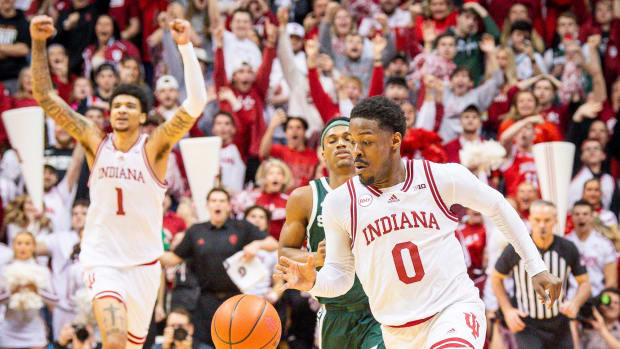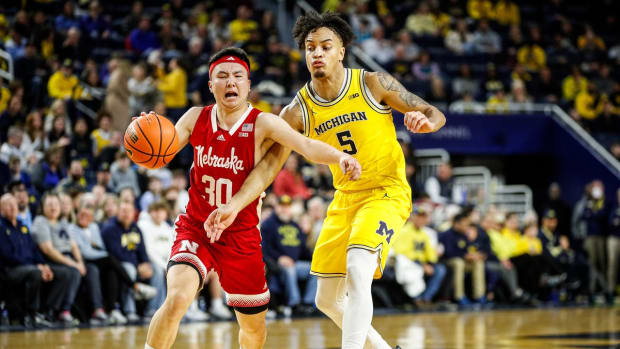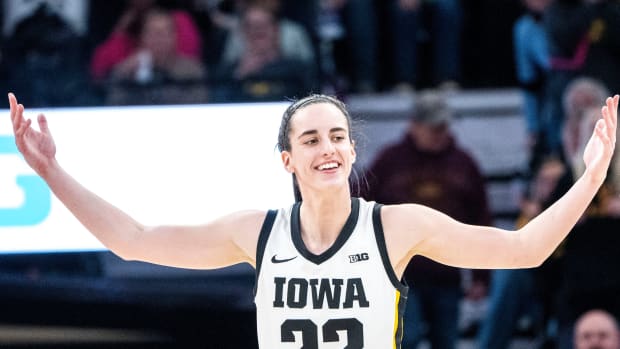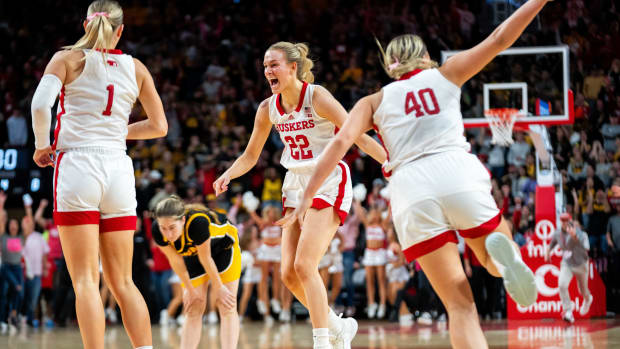Five Lineup Combinations Michigan Basketball Could Use In 2020-21
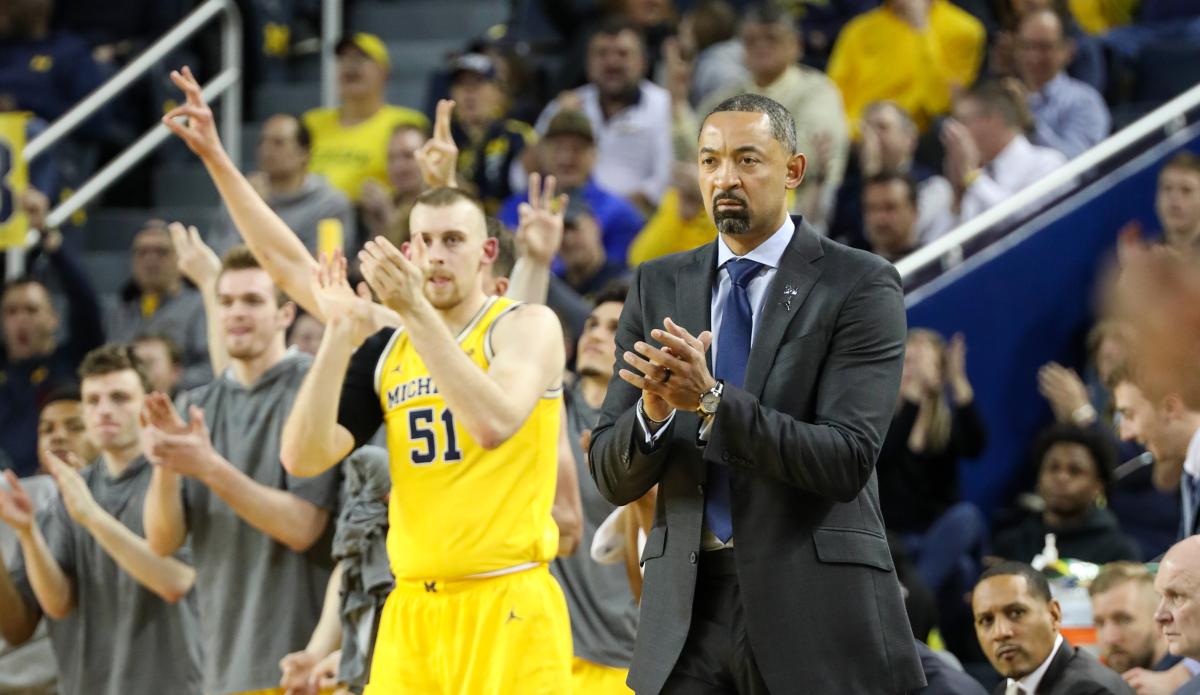
With the top-ranked recruiting class in the Big Ten coming to Ann Arbor and important pieces from this year's team returning, the Wolverines look poised to have another solid season in Juwan Howard’s second year as the head man. Michigan has added four recruits in center Hunter Dickinson, guard Zeb Jackson, forward Terrance Williams and forward Jace Howard, while also adding grad transfer point guard Mike Smith. The Wolverines should also return three starters from last year's team in Eli Brooks, Franz Wagner and Isaiah Livers. With the new additions to go along with the pieces that remain, let’s take a look at five possible lineup combinations Howard could run out on the floor for the 2020-21 season.
(1): Mike Smith (5th yr.)
(2): Eli Brooks (Sr.)
(3): Franz Wagner (So.)
(4): Isaiah Livers (Sr.)
(5): Austin Davis (Sr.)
With four seniors in this lineup, these five are certainly the most experienced bunch the Wolverines can put on the court together next year. Smith, who is coming to Ann Arbor as a graduate transfer from Columbia, led the Lions in minutes played at the point guard position in three of the last four seasons, only failing to do so his junior year because he suffered a season ending injury in the eighth game of the year. The injury gave Smith an extra year of eligibility that he elected to use at Michigan.
Smith’s three-plus years starting at the 1 for Columbia make him the most experienced point guard on the roster. Brooks has had significantly more playing time off the ball in Ann Arbor. Brooks played 91% of his minutes at shooting guard, during the Wolverines final five games of this year. The 6-1 guard is very effective off the ball, as he is one of the Wolverines’ best catch-and-shoot three-point shooters. Brooks led the team with 52 three-point makes this past year and was second on the team in three point percentage at 36.4%.
Despite Wagner being 6-8, he is a guard-forward and could easily play the 2 or 3 for Michigan. Wagner played most of his minutes at the 3 last season. In the last five games of the year, Wagner played 70% of Michigan’s minutes at the 3.
Assuming rising senior Livers returns to school and stays healthy, he will be on the court for most of the lineups the Wolverines run this season. In the final five games of the season, Livers played 76% of the Wolverines' minutes at the 4.
After a great showing off the bench this season, working his way up to almost 30% of Michigan’s minutes at the 5 in the Wolverines’ final five games, Davis will certainly get big minutes at the center spot again next year.
(1): Eli Brooks (Sr.)
(2): Franz Wagner (So.)
(3): Isaiah Livers (Sr.)
(4): Brandon Johns Jr. (Jr.)
(5): Hunter Dickinson (Fr.)
With Brooks being the only player in this unit smaller than 6-7, this lineup is very similar to the one Michigan started against Wisconsin this past season when Brooks was out with a nose injury. Against the Badgers, Michigan started Simpson who is 6-0, Wagner who is 6-8, Livers who is 6-7, Johns Jr. who is 6-8 and Teske who is 7-1.
With the length of this lineup and Brooks’ fantastic perimeter defense, this unit should be disruptive on the defensive end. Even though Brooks did not play a single minute at the point guard position in the last five games of this season, he still has the second-most experience playing point guard at the collegiate level on the Wolverines’ roster.
Brooks started 12 games at the 1 his freshman season and was the backup point guard for Simpson his sophomore year, playing 11% of Michigan’s minutes at the 1.
Though Brooks is capable of playing point guard, forcing him to bring up the ball would give Brooks fewer opportunities to use off-ball screens to catch and shoot, which he is extremely good at. Brooks also hasn’t shown a great ability to create shots for others, which has been a staple point for Michigan’s recent point guards, as Brooks has only had two games with more than four assists in a Wolverines uniform. Smith, for comparison, has a career average of 4.5 assists per game.
Therefore, if Brooks is running the 1, Wagner and Livers will most likely have to create more shots for themselves and others. Even if he comes off the bench this season, Johns will get some run in every game at the 4 again this season. Johns played all of his minutes at the 4 in the last five games of this year. When Johns comes into the game, Livers will usually bump up to the 3, where he played 9% of his minutes for Michigan in the final five contests of this year. When Livers moves to the 3, Wagner moves to the two-guard where he also played 9% of the Wolverines’ minutes during the last five games of the year, most of which came in the Wisconsin game.
Playing the 5 will almost always be Davis or Dickinson, and both bigs should get a lot of minutes for Michigan this year no matter who ends up starting.
(1): Zeb Jackson (Fr.)
(2): Eli Brooks (Sr.)
(3): Franz Wagner (So.)
(4): Isaiah Livers (Sr.)
(5): Austin Davis (Sr.)
If Howard does not want to go with his big lineup and one of the Wolverines’ guards needs a rest, whether it be Brooks or Smith, the four-star freshman guard Jackson can play either guard spot. If Brooks is on the court and Smith isn’t, Jackson could play point guard, as Brooks is more experienced of the ball. If Smith is on the court and Brooks isn’t, then Jackson would likely play the two-guard because Smith is more experienced running the point.
Jackson will likely play a similar role to what DeJulius played for the Wolverines this past season. DeJulius played 51.5% of Michigan’s minutes at the 1 or 2, usually coming off the bench and taking some spot minutes from one of the guards or playing in a three guard lineup, which will be discussed later on.
If the Wolverines decide not to play big or extremely small, then two of the three guards of Jackson, Brooks and Smith will usually be on the court, unless Howard wants to run out Adrien Nunez or Cole Bajema, which probably won’t happen too often. Both Nunez and Bajema rarely saw the floor this season and didn’t play at all in Michigan’s final five games.
Even with the guards switching, the frontcourt stays the same, as Wagner and Livers will be on the court for the majority of Michigan's minutes next season and both centers will rotate exclusively at the five spot.
(1): Mike Smith (5th yr)
(2): Zeb Jackson (Fr.)
(3): Eli Brooks (Sr.)
(4): Isaiah Livers (Sr.)
(5): Hunter Dickinson (Fr.)
If the Wolverines want to go with a smaller and quicker lineup they can play Smith, Jackson and Brooks at the same time. This three guard lineup would be very similar to the lineup the Wolverines used over 5% of the time during their final five games this season when Simpson, DeJulius and Brooks were on the court together. Though having a 6-1 guard playing the three isn’t the norm, Brooks did play the small forward position in 9% of his minutes in the last five Wolverine games this season.
This lineup would most often be used with Wagner on the bench. Wagner did not see any time at the power forward position in the last five games of this season. Livers would stay at the 4, and either Dickinson or Davis would once again play the 5 in this lineup, while the quickness of the Wolverines’ guards would look to create some easy baskets.
(1): Mike Smith (5th yr)
(2): Eli Brooks (Sr.)
(3): Cole Bajema (So.)
(4): Isaiah Livers (Sr.)
(5): Hunter Dickinson (Fr.)
If Wagner is on the bench and the Wolverines don’t want to go small with their three guards, they can put in Bajema, who can slot in and play wherever Wagner was, whether it be the 2 or the 3. Similarly, anytime Livers needs a few minutes on the bench, Johns would slide in for him and play the 4 spot just like he did this season. In fact, there was no lineup in the last five games of this season that did not have either Livers or Johns on the floor.
The likelihood of Wagner and Livers both taking a break at the same time in a competitive contest seems pretty slim, though, as at least one of them was on the court at all times in each of the last five Michigan games. When Livers or Wagner are on the bench, Smith will likely have to create even more opportunities for the Wolverines on the offensive end than if they both were in the game. Smith has shown, though, that he is well equipped to take control of the offense, as he averaged 22.8 points and 4.5 assists per game this season, while ranking 13th in the country in percentage of possessions used at 33.9%.

